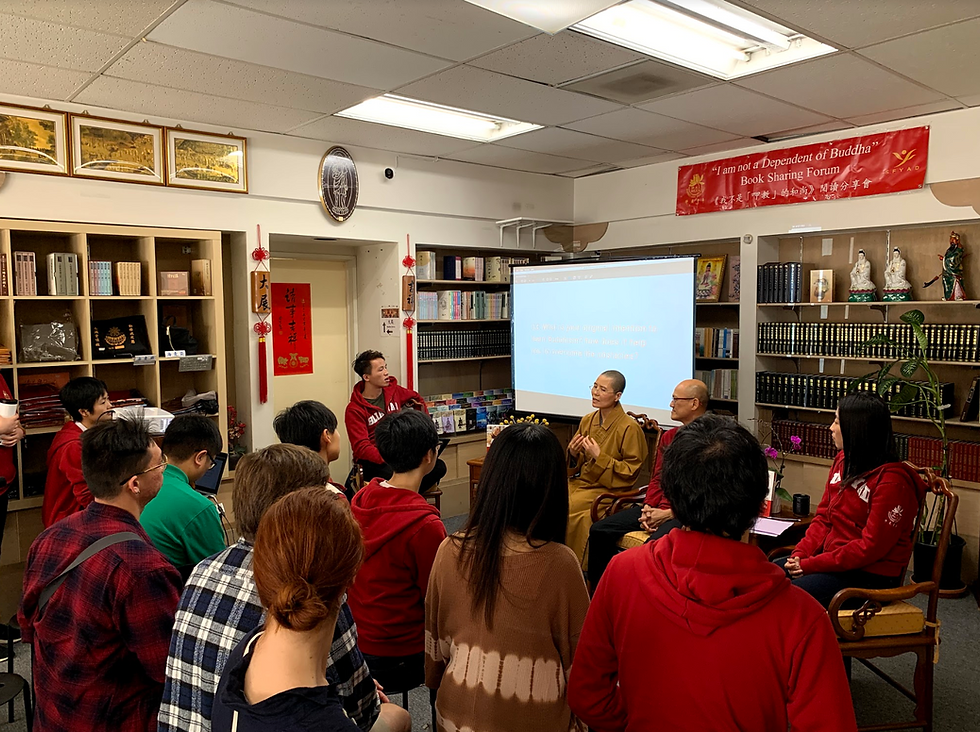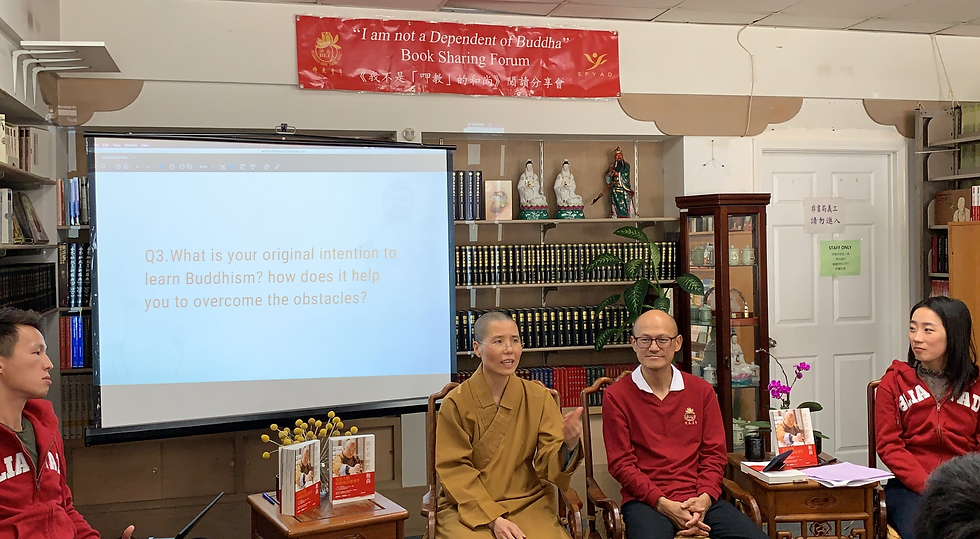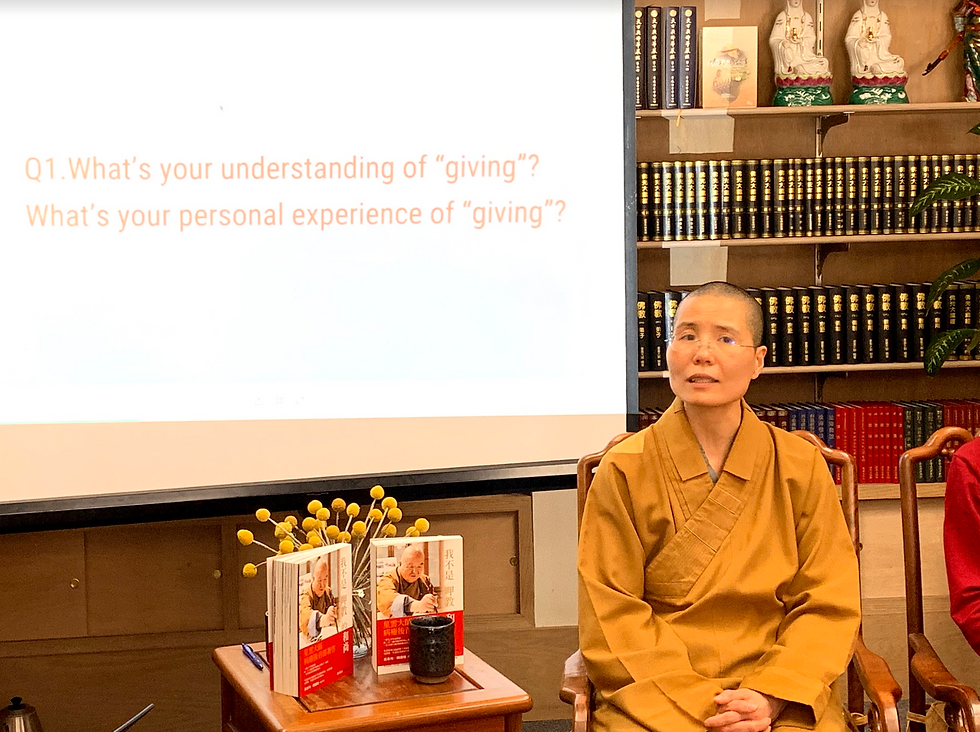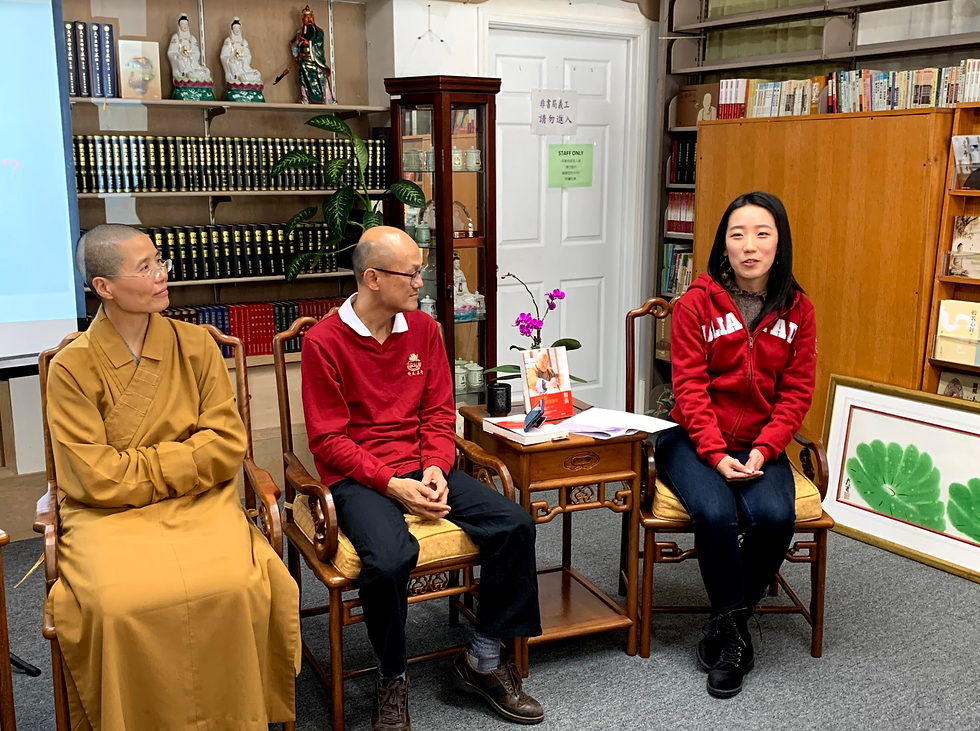"I am not a dependent of the Buddha" — Book Sharing Forum # 3
- Amanda Ong

- Nov 6, 2019
- 4 min read
Updated: Dec 3, 2019
On Saturday, October 26th, SFYAD held its third English Book Sharing Forum, where they invited Venerable Miao Zhong (SFYAD Advising Venerable), Kee Heng Tiow (SFYAD Advisor) and Yuchen Qian (SFYAD Officer). The forum, moderated by Carl Ho (SFYAD Committee) was based on the third chapter of the book “I am Not a Dependent of the Buddha”, written by Venerable Master Hsing Yun. About 15 people attended the talk, including participants who joined our online stream.

In the chapter, Venerable Master Hsing Yun stated that “giving is receiving, equanimity is gaining”. He said that if one should not depend on others without developing good affinities, but give without attaching to form and liberate sentient beings without attaching to the self. Venerable Miao Zhong shared that giving means to do one’s best to their own ability, and giving is not limited to just material wealth. She stressed the importance of “selfless giving”, as she shared the example of a group of student graduates helping the Chinese community, especially those that have limited English comprehension - setting up classes and workshops to help others understand the legal complexities in the United States; with many of these graduates forgoing work opportunities.

Kee shared that receiving is also part of giving, where he used the example of environmental preservation, as we may reap the benefits in the future from our current efforts. He highlighted that in pure giving, one should not be expecting anything in return - any expectation of reciprocation may result in suffering. Like Venerable Miao Zhong, Kee said that we should always do our best when we give, and not underestimate the power of our acts of giving, regardless of its “size”. He added that giving is an art, as there are times where people may reject the act - one should not be dismayed in these instances but learn from such experiences. Yuchen echoed Kee, where the act of giving should take into consideration the causes and conditions, i.e. a powerful gift is given with the right causes and conditions. She expressed surprise in her own ability to give Dharma; this realization came as her roommate, Amy, testified the helpful advice she received from Yuchen. Amy referred to this advice as nourishment for her mental well being, as it helped her overcome obstacles and give clarity to her problems. This exemplified the power of giving of the Dharma, which is possible for anyone to practice.
Later in the chapter, Venerable Master Hsing stressed the importance of equality, as he wrote: “I understood, if our minds are not equal, we are unable to become a real cultivator”. He also explained that in Buddhism, we cannot expect to reap without sowing, or receive privileged treatment. Using a photo below, Kee explained that equality does not simply mean “equality” at face value - as we need to look beyond the superficialities but examine the causes and conditions to give oneself greater perspectives. When talking about providing equal outcomes and opportunities, Kee used the examples of (1) empowering the physically challenged by providing accessibility, (2) giving more attention to students who need help so as to bring them to the same level.

Yuchen shared that as “learn” (such as learning in school, reading news..etc) more, while we gain knowledge, it may actually cause harm because we become more judgemental with this new knowledge. For example, a person may snob at others because he is “smarter”. By acknowledging that equality means treating all beings the same, Yuchen has a daily practice where she strives to more aware of her own judgments towards others, with the goal of breaking this habit. Through the reference of the Ten Realms, Venerable Miao Zhong explained that equality means all beings in the Ten Realms are one and the same, where one can experience the statue of Buddha at one moment and yet the state of Hell in another moment. She said that ignorance blinds us from achieving equality, and one needs to first gain the right understanding, followed by putting equality into practice, in turn cultivating oneself.
Venerable Master Hsing Yun’s admirable achievement is his patience and dedication to stay true to his original intention - to propagate Buddhism and Dharma. As he said, “Success doesn’t need to come in a rush, I can take the time, be it ten years, twenty years, I will make contributions to Buddhism.”

When asked what is their original intention to learn Buddhism, Yuchen shared that she wanted to clear up any misconceptions about Buddhism she had (a religion of praying, spiritual), and through her interactions with her Dad and her friends, she slowly realized that she had benefited from the Dharma as it taught her to see the world with more clarity, and taught her to solve problems encountered in life. Venerable Miao Zhong shared that her intention is to spread Buddhism to the youth, to help the youth gain wisdom by learning and practicing Buddhism. With that intention in mind, it serves as a powerful motivator for her to keep this promise to spread the Dharma, giving strength to continue to do so in her every moment.

Kee also shared that intent becomes a promise to oneself and added that one needs (1) patience, (2) to listen, (3) be honest to oneself and (4) stay true to our original intent. He said that we need to be humble when we are successful, and we should always keep our minds “fresh”, to always maintain a beginner's mind and open to learning. On the other hand, we need to be brave during the moments when we fail, and be patient and learn from our experiences.
During the Q&A session, on the question of an “unwholesome” intent, Venerable Miao Zhong emphasized the importance of gaining awareness, as this would allow us to apply the right view and right understanding so as to find a balance in the things we do, which was what the Buddha referred to as the Middle Path.
It was a fruitful session as the audience was able to gain insight and wisdom through the wonderful sharing by the guest speakers. The next book forum will be held on November 17 3.30pm, where we invite BLIA’s President Katy Hsu, SFYAD’s Amanda Ong, and Yen Ting Low as our panelists.




Comments